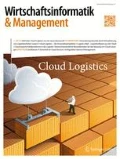Literatur
Renaud, K., Ramsay, J., Hair, M.: „You’ve got e-mail!“... Shall I deal with it now? Electronic mail from the recipient’s perspective. International Journal of Human-Computer Interaction 21, 313–332 (2006)
Barley, S.R., Meyerson, D.E., Grodal, S.: E-mail as a source and symbol of stress. Organization Science 22, 887–906 (2011)
Byron, K.: Carrying too heavy a load? The communication and miscommunication of emotion by email. Academy of Management Review 33, 309–327 (2008)
Soucek, R., Moser, K.: Coping with information overload in email communication. Evaluation of a training intervention. Computers in Human Behavior 26, 1458–1466 (2010)
Dabbish, L.A., Kraut, R.E.: Email overload at work. An analysis of factors associated with email strain. In: Hinds, P., Martin, D. (eds.) Proceedings of the 2006 20th anniversary conference on Computer supported cooperative work, pp. 431–440 (2006)
Reinke, K., Chamorro-Premuzic, T.: When email use gets out of control: Understanding the relationship between personality and email overload and their impact on burnout and work engagement. Computers in Human Behavior 36, 502–509 (2014)
Giumetti, G.W., Hatfield, A.L., Scisco, J.L., Schroeder, A.N., Muth, E.R., Kowalski, R.M.: What a rude e-mail! Examining the differential effects of incivility versus support on mood, energy, engagement, and performance in an online context. Journal of Occupational Health Psychology 18, 297–309 (2013)
Brown, S.A., Fuller, R.M., Vician, C.: Who’s afraid of the virtual world? Anxiety and computer-mediated communication. Journal of the Association for Information Systems 5, 79–107 (2004)
Mark, G., Voida, S., Cardello, A.: „A pace not dictated by electrons“. An empirical study of work without email. In: Konstan, J.A., Chi, E.H., Höök, K. (eds.) Proceedings of the SIGCHI Conference on Human Factors in Computing Systems, pp. 555–564. ACM (2012)
Burgess, A., Jackson, T., Edwards, J.: Email training significantly reduces email defects. International Journal of Information Management 25, 71-83 (2005)
Mano, R.S., Mesch, G.S.: E-mail characteristics, work performance and distress. Computers in Human Behavior 26, 61–69 (2010)
Thomée, S., Eklöf, M., Gustafsson, E., Nilsson, R., Hagberg, M.: Prevalence of perceived stress, symptoms of depression and sleep disturbances in relation to information and communication technology (ICT) Use among young adults — an explorative prospective study. Computers in Human Behavior 23, 1300–1321 (2007)
Thomée, S., Härenstam, A., Hagberg, M.: Computer use and stress, sleep disturbances, and symptoms of depression among young adults — a prospective cohort Study. BMC Psychiatry 12, 176 (2012)
Holtbrügge, D., Weldon, A., Rogers, H.: Cultural determinants of email communication styles. International Journal of Cross Cultural Management 13, 89–110 (2013)
Kushlev, K., Dunn, E.W.: Checking email less frequently reduces stress. Computers in Human Behavior 43, 220–228 (2015)
Gupta, A., Sharda, R., Greve, R.A.: You’ve got email! Does it really matter to process emails now or later? Information Systems Frontiers 13, 637–653 (2011)
McMurtry, K.: Managing email overload in the workplace. Performance Improvement 53, 31–37 (2014)
Adam, M.T.P., Gimpel, H., Maedche, A., Riedl, R.: Design blueprint for stresssensitive adaptive enterprise systems. Business & Information Systems Engineering 59, 277–291 (2017)
Author information
Authors and Affiliations
Rights and permissions
About this article
Cite this article
Riedl, R., Fischer, T. Stress durch E-Mail: Forschungsbefunde und Praxisimplikationen. Wirtsch Inform Manag 9, 22–31 (2017). https://doi.org/10.1007/s35764-017-0122-2
Published:
Issue Date:
DOI: https://doi.org/10.1007/s35764-017-0122-2

